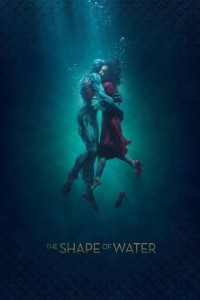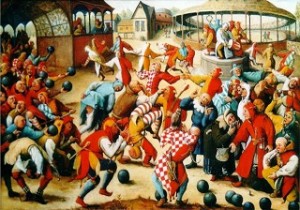
Arquivo para a ‘Linguagens’ Categoria
The Ontological Resumption
Heidegger shows in his work that a question never touched (at least in depth) in philosophy is  the “sense of being,” and this was due to the fact that in traditional metaphysics all ontology has become an ontology of substance, Thomas Aquinas’s thought is important, for it has been separated from being of essence.
the “sense of being,” and this was due to the fact that in traditional metaphysics all ontology has become an ontology of substance, Thomas Aquinas’s thought is important, for it has been separated from being of essence.
The primacy of the “thing” which we have made a relation to being-of-beings, is how the “thing” became represented for all that “is,” but rejecting its ontology, not only rejecting the thing abstract, but from the existential point of view, the question of being is eminently concrete, because “being is always the being of an entity.”
But what are the questions for modernity imposed on the Being? the essential determinations of being of beings?
It is a way which must lie below the empirical or ontic plane (of beings) and constitute the condition of possibility of the same, and these ontological structures explicit in the analysis of dasein (such as occupation, disposition, understanding, discourse) should not be confused with those who would be their ontological or empirical correlates (affection, desire, knowledge, language).
It is a matter of precedence, for they are neither unreal nor correlate, for every existential analytic “is before all psychology, anthropology and, above all, biology.” (Heidegger 1995, pp. 81)
In Heidegger in the being of man there is a pre-sence -, a fundamental ontological dimension. Indeed, in Heidegger’s text, the status of the claim is ambiguous.
The translation of Dasein was preferred as such, so that it is not understood as synonymous with “man” (the being-there has this ambiguity), in the ontological determination, what corresponds to the being of this being is his pre-sence and this is the question.
Their relationship may seem paradoxical, as many authors think, in the relation of being to being, but it is not, it is possible to live divinely this pre-sence, not nihil.
A biblical passage almost unexplored by scholars of the sacred text, is when approaching the Passover of Jesus, he says he is distressed and also sees himself before a “void”, in John in 27-28 it is written thus:
“Now I feel distressed. And what shall I say? ‘Father, save me from this hour?’ But it was precisely for this hour that I came. Pai, glorify thy name! ” and the crowd, which was there and heard, said that it had been thunder. “I glorify him!”.
This question is not “nihil” but it is the Easter, pass to dead for live, not dead only.
—
Note: – This is translation from Márcia de Sá Cavalcante for “dasein”.
Heidegger, M. (1995) Ser e Tempo (parte I). Petrópolis: Vozes. (Brazil)
Being, things and gadgets
 This name for digital devices appeared long before the internet and the digital explosion, is in Marshall McLuhan’s book of the 1960s: Understanding Media.
This name for digital devices appeared long before the internet and the digital explosion, is in Marshall McLuhan’s book of the 1960s: Understanding Media.
Many remember him only by the phrases: “the global village” and “the medium is the message,” but few are aware of his approach to the digital world, and still less is he aware of the profound influence that Teilhard Chardin’s Noosphere had on his mind.
Some of McLuhan’s main ideas consisted in foreseeing a more conscious world and even “even in a hyperconnected world, where everyone has the ability to regulate their own experience,” a reading different from the apocalyptic ones.
The ideas that many learn well but continue to forget are the advances and possibilities of a world increasingly a “village” and that problems previously veiled, such as being itself was veiled, are now exposed by the “media.”
We just have to choose to exclude these advances, if we are hiding in our minds somehow, our consciousness of being, of everything that exists beyond the labels and devices that they use, this is not for the internet, but for cars, designer clothes , finally, a series of objects of consumption that seem to qualify the being, and why there is so much emptiness?
This is what we tried to answer in the previous posts, too academic perhaps, but without revisiting human thought we can stay in the superficiality of “things”.
To escape from a difficult discourse about being, but one must recognize it as “being-of-all” I read a page from the Gift of the Sea, Anne Morrow Lindbergh, who writes:
“For life today in America is based on the premise of ever-widening circles of contact and communication. It involves not only to family demands, but community demands, national demands, international demands on the good citizen, through social and cultural pressures, through newspapers, magazines, radio programs, political drivers, charitable appeals and so on. My mind reels with it…It does not bring grace; it destroys the soul.”
But she was not talking about the Internet, Makron Books released a book commemorating 50 years of the book in 2015, the book is from 1975, so this was already a previous reality of the internet, just as the gadget name was used by McLuhan in the 60’s .
This is a reality of Being, already observed at the beginning of the last century, the digital world is an additional component in the complexity of contemporary man.
The truht and the soul

Augustine, although the study of being was already present in Plato and Aristotle, the truth was for them more “soon” than “ontos”, since the Being and it should “contain” the truth.
This will have enormous relevance to human thought, for it means that there is something inside the man that must be “unveiled.”
In St. Augustine this tension meant that man only remains in outer things, and then empties himself of himself, then began a kind of asceticism where man recovers his intimacy, when he penetrates precisely that which is the inner man, and this tension will culminate at the end of the Middle Ages in a separation between the Being and the object, in fact, precisely this separation projected the man in the “objective”.
Augustine will say in his asceticism, “in overcoming you, however, do not forget that you transcend your reasoning soul. Therefore, I have addressed you to the source of the very light of reason. ” (St. Augustine, The True Religion 39, 72).
It is clear that the Augustinian cogito is not the Cartesian, who was distant in time and also in conception, but he prepared this way, the man desirous of the control of objects and of nature, the man who built his inner castle, is seen in the beginning of modernity projected on objects.
For Kant, the “agreement of knowledge with the object” means “the agreement of the understanding with the object that is grasped by it, namely, the phenomenon.” Thus the Kantian definition is effective if understood in the sense of Thomas Aquinas’s adaequatio rei et intellectus, and in this sense Kant’s theory of transcendental truth which implies the truth of transcendental knowledge in the end it is an ontology, the theory of being of beings, or of the object domain, [that is] of objects. ”
Although the thought of Thomas Aquinas, in his doctoral thesis on “Being and essence” things are still “adequate” reason, in Kant and modernity they will be “outside” and the ontology will be reduced to a onto -that is, only religious.
The Oscar goes to …
United States of America without a doubt, but we hope the indications of The post,  the film that revealed the backstage of The Washington Post in 1971, about the Vietnam War, with indications, among them, of the laureate Meryl Streep , the hottest speech at this year’s Golden Globe, which was famous for black dresses and suits, perhaps the allusion to the white Golden Globe of years ago, but which was actually more about women than about black people.
the film that revealed the backstage of The Washington Post in 1971, about the Vietnam War, with indications, among them, of the laureate Meryl Streep , the hottest speech at this year’s Golden Globe, which was famous for black dresses and suits, perhaps the allusion to the white Golden Globe of years ago, but which was actually more about women than about black people.
I commented on the disappointment of 13 nominations for “The Shape of Water” (photo), but the good surprise of the actress Mary J. Blige with two nominations best supporting actress and best original song in “Mudbound”.
Blade Runner 2049 only consolation prizes, if they came out: art, photography, special effects and editing and sound mixing, I expected more, but I saw that even the public does not welcome what is for me, and many scholars of modern fiction, the matrix of current fiction films.
Surprisingly, I went to watch and I do not think it’s all this, “Dunkirk” by British Christopher Nolan (eight nominations), and the independent production “Three Billboard Outside Ebbing” (trailer), and “The Destiny of a Nation” Winston Churchill, with six nominations, the same number as the drama “Ghost Plot,” are not all that.
For us Brazilians two consolations, the presence of director Carlos Saldanha of “The bull Ferdinando” indication of better animation and the producer Rodrigo Teixeira is involved in the co-production: Brazil-Italy-France in the nomination of the film: Call Me by Your Name.
h almost forgot, I went to watch and liked the movie: The Greatest of Showman, surprised and thrilled.
To paraphrase Bauman, I hope that the Oscars are not liquid, the awards take place in night hours of Sunday
The zeal of the House and the “temple” reconstruction
In the biblical passage where Jesus expels temple merchants, vendors, and other traders of religious relics of his time (Jn 2: 13-16), it is more common to remember the rope whip than the next passage that says (John 2,19 ): “Destroy this Temple, and in three days I will raise it,” which seemed absurd since the temple was built in 46 years and how it would do it in 3 days.
of his time (Jn 2: 13-16), it is more common to remember the rope whip than the next passage that says (John 2,19 ): “Destroy this Temple, and in three days I will raise it,” which seemed absurd since the temple was built in 46 years and how it would do it in 3 days.
The first part is best remembered by exegetes because there was the prophecy about what messiah that “Zeal for thy house shall consume me” (Psalm 69: 9) and therefore, in Jesus this prophecy is confirmed.
It is true that he spoke of his body rebuilding in 3 days, since it dies during the Jewish Paschua, which now due to the calendar does not always coincide with the Christian, but Jesus dies on Thursday when a lamb should be killed to eat it at the end of the Friday night, and at Christian Easter he is himself the lamb slain.
There is no doubt that the Battle of Guernica (1937), painting by Pablo Picasso is a symbol of our time, the war that shatters the BEING.
Seen as a sign of the times we must think that also the destruction and reconstruction of societies and cultures in our time have shortened, if this was done in more than a generation, today both destruction and reconstruction are fast and can take only hours.
The speed of information, which is often disinformation can destroy and build quickly, typical of the present times, is usually remembered only to deconstruct, a term used in philosophy, but there is also the construction in many areas of knowledge and sociability.
The Internet from the late 1970s to the 1990s changed the sociability of communication, the Web became popular content in 15 years, from 1990 to 2005 when Web 2.0 came on, and now IoT promises to change more deeply in a short time, but Has society changed? these are considerations of language and structure, but the “temple” is that of the “Being”, ontologically established and this is before any technology continues to be, with anguish and hopes.
It is a temple of reconstruction of the “temple” of being, but this means changing the structures, the form in which the content is expressed and “in-form”, in it will live the “Being” of our new time.
The crisis and the ashes
The economic, political and social crisis is worldwide, but the Brazilian has more of an ash  Wednesday than carnival, but it is possible to survive in the crisis.
Wednesday than carnival, but it is possible to survive in the crisis.
A suggestive and profound book is the book in partnership with Edgar Morin and Patrick Viveret: How to live in times of crisis? (Bertrand Brasil, 2013), who suggest in the book “I risk the hypothesis that perhaps we have reached a moment of rupture” (page 22), but what rupture?
Ortega y Gasset recalls, “we do not know what happens, and this is exactly what happens”, says this about the difficulty of relating facts, the digital revolution, the resurgence of nations (Armenian, Kurds, Croatians among many others), the great Asian tigers jumps, finally a great range of new relations, and now new tensions and wars in Africa.
The pragmatists, who do not know the complexity, want to be practical, ignore the theory or repeat only a single author, the illusion of a “universal” theory, what we need Morin and Viveret: “the present, the real is not what it seems stable … one must be open to the uncertain, to the unexpected. “(p.25).
But the authors ask: “What then, the good news? An awareness of the breadth, of the complexity, of a new beginning. We are in a period of planetary crisis and we do not know what will come of it; what counts on the possibility of transcending this crisis will be good news “(p.27).
Viveret writes in the chapter “What will we do in our lives,” stating that we should go out of the way to preserve the best “, but paradoxically” maintaining the lucidity that there is the worst “(p.44), does not seem to give a definitive solution, but we can find the best of “traditional societies and civilizations”, and we must know these civilizations.
Emphasize the author that “it is necessary to reappropriate democratically and semantically the words ‘value’ and ‘richness’ whose root reich (in German) refers to the creative power” (pages 60 and 61).
He also recalls Karl Polanyi, in his book “The Great Transformation”, “analyzes the market economies that are legitimate for market societies that are dangerous, that is, the moment when commodification invades the whole social universe . “(P.61). The author gives us as a remedy to leave the infernal pair “excitement / depression,” to move toward another pair: “intensity / serenity” (p.76).
They end the book by saying that it is “necessary to grow in humanity.”
The bas-fonds and the Carnival
Walking through the central streets of my hometown, Bauru of São Paulo (Brazil), I pass by a girl already with a bean and a lady’s body, with a sandal with moorings and silver pieces of leather, wearing shorts that barely closes at the thick waist, a dark T-shirt with the Eiffel tower and the word Paris printed in his t-shirt in Golden color, I remembered the book by Dominique Kalifa: Bas-Fonds: History of an Imaginary (edUsp, 2017).
by a girl already with a bean and a lady’s body, with a sandal with moorings and silver pieces of leather, wearing shorts that barely closes at the thick waist, a dark T-shirt with the Eiffel tower and the word Paris printed in his t-shirt in Golden color, I remembered the book by Dominique Kalifa: Bas-Fonds: History of an Imaginary (edUsp, 2017).
The book I mistakenly bought at the end of the year thought to be the origin of the Happy Holidays, the traditional end-of-year greetings, but when I opened the book I understood the “cities in crisis”, the dirty, the greasy and the deformed one, the Kingdom of the Destitute, Sodom, Rome and Babylon, finally some of the chapters of the book of Dominique Kalifa.
In fact the center of the cities became peripheral, at least in the medium cities, and the centers went to the malls in some condominium closed to the condominiums, where there are clubs, bars, shops and even chapels, privatizing the jogging.
The author says, “the bas-fonds … understand each other instantly” (Dominique, 2017, p.11), perhaps in French but in Portuguese english it took me a long time to connect the periphery (which nowadays frequent central commerce) and Carnival fantasies (at least the Brazilian, made by people from the periphery)..
I find in the beginning of the book the connection with the carnival: “the bas-fonds extend through a mobile, vague terrain in which reality, the worst of realities, is in collusion with the imaginary, a terrain in which the social ‘Is constantly redefined by the’ moral ‘, in which the flesh-and-blood beings mingle with characters of fiction “(ibid, p. 11).
He clarifies that from the “positive” figure of the Greek philosopher Diogenes “the poor of God, the” poor of Christ “,” the poor with Peter “of the Middle Ages, XIII “in France and England, the terms of vagond and vagrant” (page 69), which the author calls “the invention of the poor poor.”.
Dominique goes on to cite a number of authors: “The comparison of the threatening proletarians with the Indians of America is a recurrent motive, which explains in part the immense success [of the Fenimore Cooper novels]” (page 109) , also quotes: Balzac, Sainte-Beuve, Dumas, George Sand, Maxime du Camp, Eugène Sue, Bérange and others mentioned in previous pages, fall in love with “Walter Scott of the wilds” (of book of the Henri Couvain).
Just to tell you how universal it is, I also remember “Bola de Sebo” tale by Guy de Maupasanti, and the film Rale (Donzoko, 1957) whose translation into French exactly by The Bas-fonds, little known film of this great diretor.
The origin of the carnival however is more controversial, the Carnival of Venice or perhaps the party of the crazy, described in 1445 like “party of the crazy ones” made in the faculty of Theology of Paris (modern engraving picture above).
The transformation of the joy of the imaginary of the poor has become almost everywhere, a private party in which the parade of the imagination of the bas-fonds is watched.
Kalifa, Dominique.Os bas-fonds: história de um imaginario (The bas-fonds: History of an imaginary), trad. Márcia Aguiar, São Paulo: Edusp, 2017.

